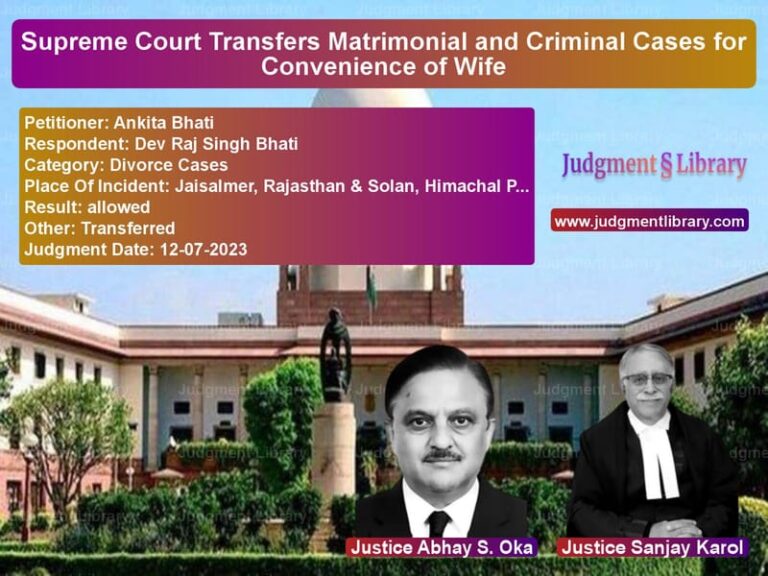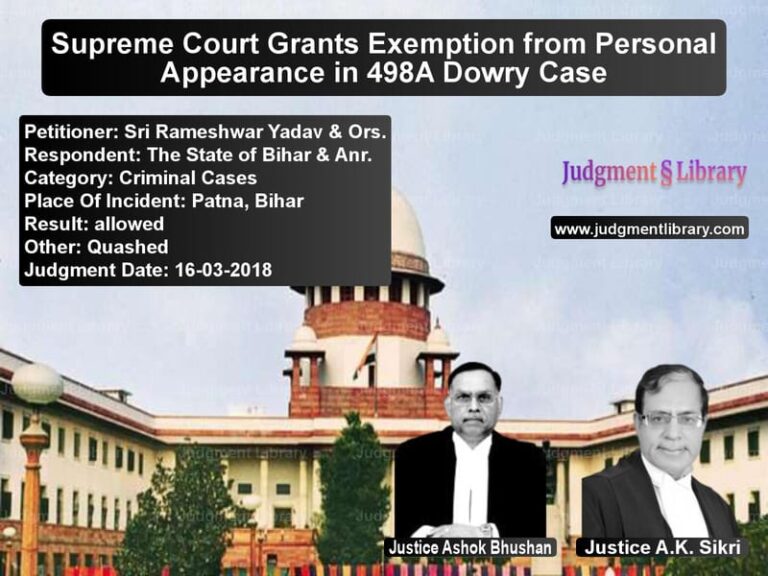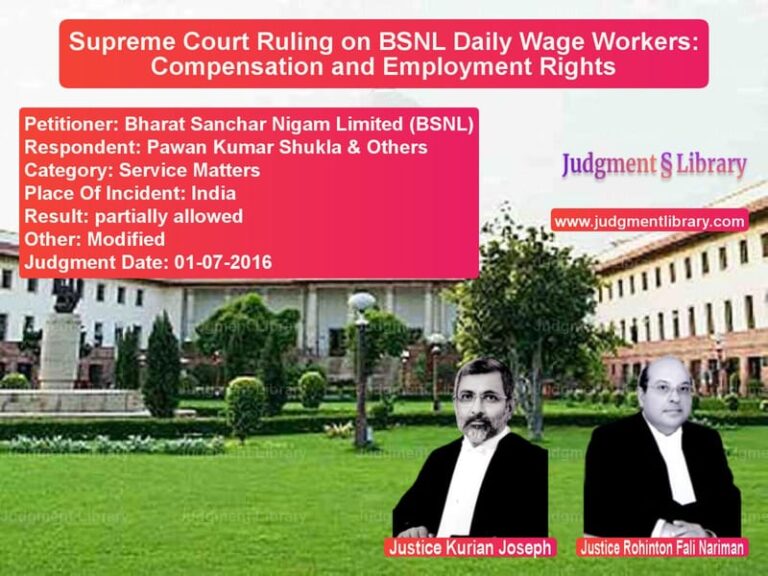Supreme Court Acquits Woman Convicted of Murder Due to Juvenility at the Time of Offense
The Supreme Court of India has quashed the conviction of Pramila, who was previously sentenced to life imprisonment for murder, after determining that she was a juvenile at the time of the offense. The case, Pramila vs. State of Chhattisgarh, underscores the importance of legal protections for minors under the Juvenile Justice Act and highlights how retrospective application of juvenile justice laws can impact long-standing convictions.
Background of the Case
The appellant, Pramila, was convicted by the Additional Sessions Judge, Ramanujganj, District Sarguja, Chhattisgarh, for murder under Sections 302 and 201 read with Section 34 of the Indian Penal Code, 1860. She was sentenced to life imprisonment in 2003, a decision later upheld by the Chhattisgarh High Court on May 3, 2010. Pramila then approached the Supreme Court challenging her conviction.
Legal Issue: Claim of Juvenility
During the appeal, the issue of juvenility was raised. Pramila filed an interlocutory application claiming that she was a minor when the crime occurred on June 15, 2000. The Supreme Court, in its order dated September 13, 2023, directed the Sessions Court to conduct an inquiry into her age at the time of the offense.
Findings on Age Determination
The inquiry conducted by the First Additional Sessions Judge, Ramanujganj, District Balrampur, concluded that:
- Pramila’s date of birth was September 1, 1982.
- On the date of the offense (June 15, 2000), she was 17 years, 9 months, and 14 days old.
- Her age was confirmed through school records, including her school leaving certificate (1988) and primary examination results (1995).
Based on these findings, the Supreme Court determined that Pramila was a juvenile at the time of the crime and should have been tried under the Juvenile Justice Act, 1986.
Legal Provisions Governing Juvenile Offenders
At the time of the offense in 2000, the applicable law was the Juvenile Justice Act, 1986. Under Section 2(h) of this Act, a ‘juvenile’ was defined as:
- A boy who had not attained the age of 16 years.
- A girl who had not attained the age of 18 years.
Since Pramila was below 18 years, she was entitled to the protections provided under the 1986 Act. Under Section 22(1), juveniles could not be sentenced to imprisonment and were instead to be placed in a special home for a period not exceeding three years.
Arguments by the Appellant (Pramila)
Pramila’s counsel argued:
- The appellant was a minor at the time of the offense, and her trial under the regular criminal procedure was illegal.
- Her conviction should be set aside as the law prohibits imprisonment of juveniles.
- Since she had already spent over eight years in prison, no further proceedings were necessary under the Juvenile Justice Act.
Arguments by the Respondent (State of Chhattisgarh)
The State opposed the appeal, arguing:
- The appellant had been convicted based on credible evidence.
- The juvenile claim was raised much later and should not be considered.
- Even if Pramila was a minor, the appropriate remedy was to refer the case to the Juvenile Justice Board.
Supreme Court’s Observations
After reviewing the case, the Supreme Court made the following observations:
“Since the appellant was a juvenile at the time of the offense, she ought to have been dealt with under Section 21 of the Juvenile Justice Act, 1986.”
“A juvenile cannot be sentenced to imprisonment. The maximum penalty under the 1986 Act for a minor female was placement in a special home for three years.”
“Given that the appellant has already undergone more than eight years of incarceration, sending her to a Juvenile Justice Board now would serve no purpose.”
Final Judgment
The Supreme Court ruled:
- The conviction of Pramila was quashed.
- The orders of the High Court (dated May 3, 2010) and Sessions Court (dated June 30, 2003) were set aside.
- Since Pramila had already spent over eight years in prison, no further action would be taken.
- The bail bonds of the appellant were cancelled.
Implications of the Judgment
The Supreme Court’s decision has significant implications:
- Recognition of Juvenile Rights: The judgment reaffirms that juveniles cannot be subjected to regular criminal trials and must be treated under the juvenile justice system.
- Retrospective Application of Juvenile Justice Laws: Even if a conviction is decades old, courts can still review and overturn sentences if the accused was a minor at the time.
- Need for Age Verification in Trials: The case highlights the importance of verifying the accused’s age at the outset to prevent wrongful convictions.
Conclusion
The Supreme Court’s ruling in Pramila vs. State of Chhattisgarh is a landmark decision in juvenile justice. It corrects a legal oversight by ensuring that juveniles are not tried as adults and reinforces the principle that minors should be given rehabilitative, not punitive, measures. By overturning Pramila’s conviction, the Court upholds the core tenets of justice and fairness in legal proceedings.
Read also: https://judgmentlibrary.com/supreme-court-upholds-life-sentence-in-puducherry-murder-case/
Petitioner Name: Pramila.Respondent Name: State of Chhattisgarh.Judgment By: Justice Abhay S. Oka, Justice Ujjal Bhuyan.Place Of Incident: Chhattisgarh.Judgment Date: 17-01-2024.
Don’t miss out on the full details! Download the complete judgment in PDF format below and gain valuable insights instantly!
Download Judgment: pramila-vs-state-of-chhattisgar-supreme-court-of-india-judgment-dated-17-01-2024.pdf
Directly Download Judgment: Directly download this Judgment
See all petitions in Juvenile Justice
See all petitions in Bail and Anticipatory Bail
See all petitions in Custodial Deaths and Police Misconduct
See all petitions in Judgment by Abhay S. Oka
See all petitions in Judgment by Ujjal Bhuyan
See all petitions in allowed
See all petitions in Quashed
See all petitions in supreme court of India judgments January 2024
See all petitions in 2024 judgments
See all posts in Criminal Cases Category
See all allowed petitions in Criminal Cases Category
See all Dismissed petitions in Criminal Cases Category
See all partially allowed petitions in Criminal Cases Category







